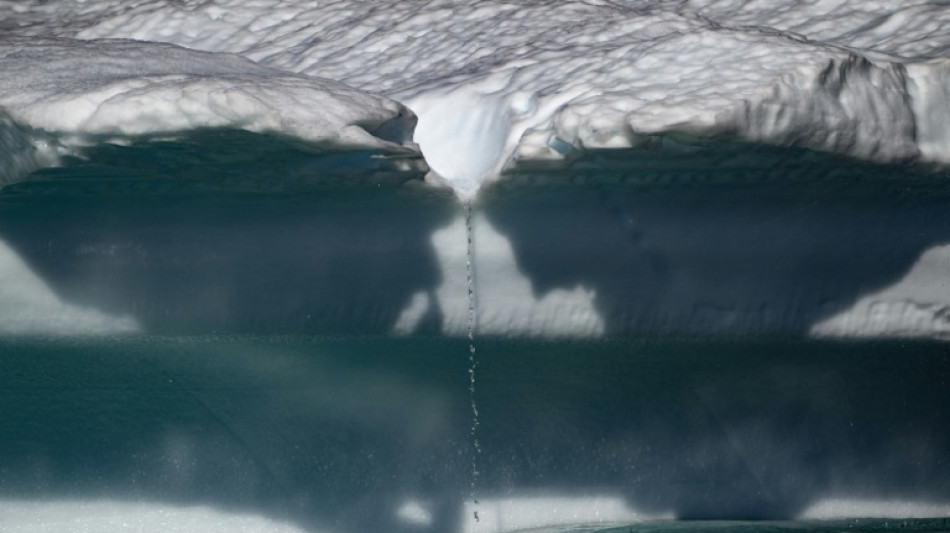
-
 Argentina beat Scotland after stunning fightback
Argentina beat Scotland after stunning fightback
-
Pope urges leaders not to leave poor behind

-
 Pressure will boost Germany in 'knockout' Slovakia clash, says Nagelsmann
Pressure will boost Germany in 'knockout' Slovakia clash, says Nagelsmann
-
Ecuador votes on hosting foreign bases as Noboa eyes more powers

-
 Portugal qualify for 2026 World Cup by thrashing Armenia
Portugal qualify for 2026 World Cup by thrashing Armenia
-
Greece to supply winter gas to war battered Ukraine

-
 India and Pakistan blind women show spirit of cricket with handshakes
India and Pakistan blind women show spirit of cricket with handshakes
-
Ukraine signs deal with Greece for winter deliveries of US gas

-
 George glad England backed-up haka response with New Zealand win
George glad England backed-up haka response with New Zealand win
-
McIlroy loses playoff but clinches seventh Race to Dubai title

-
 Ecuador votes on reforms as Noboa eyes anti-crime ramp-up
Ecuador votes on reforms as Noboa eyes anti-crime ramp-up
-
Chileans vote in elections dominated by crime, immigration

-
 Turkey seeks to host next COP as co-presidency plans falter
Turkey seeks to host next COP as co-presidency plans falter
-
Bezzecchi claims Valencia MotoGP victory in season-ender

-
 Wasim leads as Pakistan dismiss Sri Lanka for 211 in third ODI
Wasim leads as Pakistan dismiss Sri Lanka for 211 in third ODI
-
Serbia avoiding 'confiscation' of Russian shares in oil firm NIS

-
 Coach Gambhir questions 'technique and temperament' of Indian batters
Coach Gambhir questions 'technique and temperament' of Indian batters
-
Braathen wins Levi slalom for first Brazilian World Cup victory

-
 Rory McIlroy wins seventh Race to Dubai title
Rory McIlroy wins seventh Race to Dubai title
-
Samsung plans $310 bn investment to power AI expansion

-
 Harmer stars as South Africa stun India in low-scoring Test
Harmer stars as South Africa stun India in low-scoring Test
-
Mitchell ton steers New Zealand to seven-run win in first Windies ODI

-
 Harmer stars as South Africa bowl out India for 93 to win Test
Harmer stars as South Africa bowl out India for 93 to win Test
-
China authorities approve arrest of ex-abbot of Shaolin Temple

-
 Clashes erupt in Mexico City anti-crime protests, injuring 120
Clashes erupt in Mexico City anti-crime protests, injuring 120
-
India, without Gill, 10-2 at lunch chasing 124 to beat S.Africa

-
 Bavuma fifty makes India chase 124 in first Test
Bavuma fifty makes India chase 124 in first Test
-
Mitchell ton lifts New Zealand to 269-7 in first Windies ODI

-
 Ex-abbot of China's Shaolin Temple arrested for embezzlement
Ex-abbot of China's Shaolin Temple arrested for embezzlement
-
Doncic scores 41 to propel Lakers to NBA win over Bucks

-
 Colombia beats New Zealand 2-1 in friendly clash
Colombia beats New Zealand 2-1 in friendly clash
-
France's Aymoz wins Skate America men's gold as Tomono falters

-
 Gambling ads target Indonesian Meta users despite ban
Gambling ads target Indonesian Meta users despite ban
-
Joe Root: England great chases elusive century in Australia

-
 England's Archer in 'happy place', Wood 'full of energy' ahead of Ashes
England's Archer in 'happy place', Wood 'full of energy' ahead of Ashes
-
Luxury houses eye India, but barriers remain

-
 Budget coffee start-up leaves bitter taste in Berlin
Budget coffee start-up leaves bitter taste in Berlin
-
Reyna, Balogun on target for USA in 2-1 win over Paraguay

-
 Japa's Miura and Kihara capture Skate America pairs gold
Japa's Miura and Kihara capture Skate America pairs gold
-
Who can qualify for 2026 World Cup in final round of European qualifiers

-
 UK to cut protections for refugees under asylum 'overhaul'
UK to cut protections for refugees under asylum 'overhaul'
-
England's Tuchel plays down records before final World Cup qualifier

-
 Depoortere double helps France hold off spirited Fiji
Depoortere double helps France hold off spirited Fiji
-
Scotland face World Cup shootout against Denmark after Greece defeat

-
 Hansen hat-trick inspires Irish to record win over Australia
Hansen hat-trick inspires Irish to record win over Australia
-
Alcaraz secures ATP Finals showdown with 'favourite' Sinner

-
 UK to cut protections for refugees under asylum 'overhaul': govt
UK to cut protections for refugees under asylum 'overhaul': govt
-
Spain, Switzerland on World Cup brink as Belgium also made to wait

-
 Sweden's Grant leads by one at LPGA Annika tournament
Sweden's Grant leads by one at LPGA Annika tournament
-
Scotland cling to hopes of automatic World Cup qualification despite Greece defeat


Humanity deep in the danger zone of planetary boundaries: study
Human activity and appetites have weakened Earth's resilience, pushing it far beyond the "safe operating space" that keeps the world liveable for most species, including our own, a landmark study said Wednesday.
Six of nine planetary boundaries -- climate change, deforestation, biodiversity loss, synthetic chemicals including plastics, freshwater depletion, and nitrogen use -- are already deep in the red zone, an international team of 29 scientists reported.
Two of the remaining three -- ocean acidification along with the concentration of particle pollution and dust in the atmosphere -- are borderline, with only ozone depletion comfortably within safe bounds.
The planetary boundaries identify "the important processes that keep the Earth within the kind of the living conditions that prevailed over the last 10,000 years, the period when humanity and modern civilisation developed", said lead author Katherine Richardson, a professor at the University of Copenhagen's Globe Institute.
The study is the second major update of the concept, first unveiled in 2009 when only global warming, extinction rates, and nitrogen had transgressed their limits.
"We are still moving in the wrong direction," said co-author Johan Rockstrom, director of the Potsdam Institute for Climate Impact Research (PIK) and a co-creator of the schema.
"And there's no indications that any of the boundaries" -- except the ozone layer, slowly on the mend since the chemicals destroying it were banned -- "have started to bend in the right direction", he told journalists in a briefing.
"This means we are losing resilience, that we are putting the stability of the Earth system at risk."
The study quantifies boundaries for all nine interlocking facets of the Earth system.
- Headed for disaster -
For biodiversity, for example, if the rate at which species disappear is less than 10 times the average extinction rate over the last 10 million years, that is deemed acceptable.
In reality, however, extinctions are occurring at least 100 times faster than this so-called background rate, and 10 times faster than the planetary boundary limit.
For climate change, that threshold is keyed to the concentration of atmospheric CO2, which remained very close to 280 parts per million (ppm) for at least 10,000 years prior to the industrial revolution.
That concentration is today 417 ppm, far above the safe boundary of 350 ppm.
"On climate, we're still following a pathway that takes us unequivocally to disaster," said Rockstrom. "We're headed for 2.5C, 2.6C or 2.7C -- a place we haven't seen for the past four million years."
"There's no evidence whatsoever that humans can survive in that environment," he added.
Thousands upon thousands of chemical compounds created by humans -- from micro-plastics and pesticides to nuclear waste and drugs that have leached into the environment -- were quantified for the first time in the new research, and found to exceed safe limits.
Likewise for the depletion of "green" and "blue" water, freshwater coming from soil and plants on the one hand, and from rivers and lakes on the other.
- Setting limits -
An important finding of the new update is that different boundaries feed off and amplify each other.
The study examines in particular the interaction between increasing CO2 concentration and damage to the biosphere, especially forest loss, and projects temperature increases when one or both increase.
It shows that even if humanity rapidly draws down greenhouse gas emissions, unless destruction of carbon-absorbing forests is halted at the same time rising global temperatures could tip the planet onto a trajectory of additional warming that would be hard to stop.
"Next to climate change, integrity of the biosphere is the second pillar for our planet," said co-author Wolfgang Lucht, head of Earth System Analysis at PIK.
"We are currently destabilising this pillar by taking out too much biomass, destroying too much habitat, deforesting too much land."
All the boundaries can be brought back into the safe operating space, the study concluded.
"It's just a question of setting limits for the amount of waste we put into the open environment and the amount of living and non-living raw materials we take out," said Richardson.
Hotly debated at first, the planetary boundaries framework quickly became a pillar of Earth system science, with its influence extending today into the realm of policy and even business.
N.AbuHussein--SF-PST




